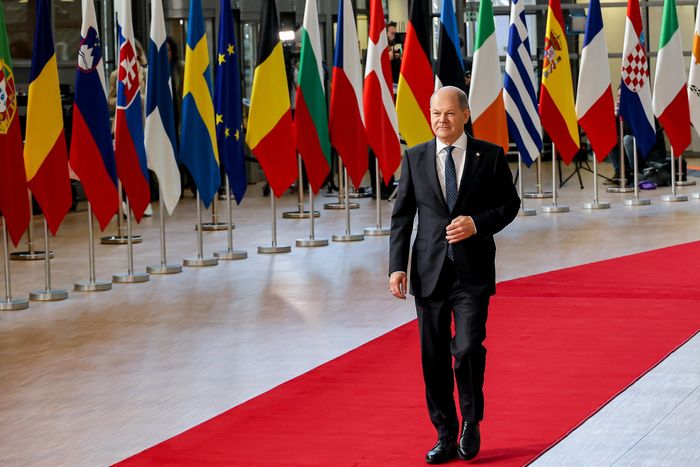BRUSSELS—European Union leaders pushed discussions on whether to pursue an emergency limit on natural-gas prices to their energy ministers after marathon negotiations over how to tackle the energy crisis brought on by Russia’s squeeze on gas supplies.
The European Council issued a set of conclusions early Friday morning saying leaders had agreed to accelerate their efforts to reduce energy demand, secure supplies and bring down prices. They also called on energy ministers and the bloc’s executive body to “urgently submit concrete decisions” on a range of measures to achieve those goals, including a possible emergency gas-price cap.
“The leaders have given the strategic guidance we wanted,” European Commission President Ursula von der Leyen said. She said details of the measures would be discussed by EU energy ministers at a meeting Tuesday.

German Chancellor Olaf Scholz arriving at the European summit on Thursday.
Photo: Nicolas Economou/Zuma Press
EU leaders, together with the U.S., U.K. and other free-market powers, have already set out plans to cap the price of oil from Russia and are now attempting to alleviate the huge economic pressure on the 27-country bloc from Russia’s efforts to squeeze natural-gas flows westward.
The European Commission this week said it wants the power to impose an emergency cap on the price of natural gas on the bloc’s main trading exchange, part of a package of proposals.
Over recent months, Moscow has progressively restricted deliveries of gas through pipelines to squeeze the supply to EU countries. Last month, flows through the Nord Stream pipelines from Russia to Germany were stopped completely after severe damage by explosions that European leaders have blamed on sabotage. Europeans suspect Russia carried out the attacks, and investigations are continuing.
The EU summit on Thursday and Friday continued recent debates over how to intervene in energy markets to relieve the pain of hefty bills for consumers without creating unwanted consequences. Undesirable spillover effects could include saddling governments with massive bills for market-intervention efforts or encouraging more gas use by depressing its price through subsidies.
The commission this week published intervention proposals that include steps to encourage companies to pool their demand and buy gas together and rules for how gas could be shared across borders if some countries run short. Other measures seek to limit volatility on energy markets and boost the financial support that can flow to struggling consumers, and establish a new trading benchmark for liquefied natural gas.

Latvian Prime Minister Krišjānis Kariņš speaking to reporters in Brussels on Thursday.
Photo: stephanie lecocq/EPA/Shutterstock
“We are at the stage where every member state is doing everything in its power to support its businesses, to support its consumers,” Latvian Prime Minister Krišjānis Kariņš said before the summit began on Thursday. “What we need to do is to look at what we can do as a union.”
The proposal for a tool allowing the EU to cap natural-gas prices in an emergency was among the most contentious topics at the summit, diplomats said. Italy, France and more than a dozen other countries have called for a limit on wholesale gas prices to help protect households and businesses. Germany disagreed, saying such a move risks diverting supplies to other buyers and encouraging more consumption.
Even if the tool for an emergency gas-price cap is established, it is possible that it will never be used, some diplomats said. Natural-gas prices in Europe slid in recent days to their lowest level since late June, as forecasts for mild fall weather curbed the outlook for demand and storage sites filled close to capacity.
Leaders also discussed whether to limit the price of gas that is used for electricity generation—a step that Spain and Portugal have already taken. The commission said earlier this week that it needed more time to study the potential consequences of applying that cap across the rest of the bloc, including the unequal financial impacts it could have on different countries.
In their statement early Friday, EU leaders said officials would continue to look at the measure. They said such a cap should include a cost and benefit analysis, ensure gas use doesn’t rise and address uneven effects across the bloc.
Write to Kim Mackrael at kim.mackrael@wsj.com and Daniel Michaels at Dan.Michaels@wsj.com
Copyright ©2022 Dow Jones & Company, Inc. All Rights Reserved. 87990cbe856818d5eddac44c7b1cdeb8


